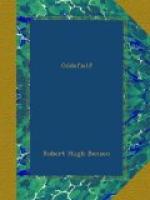He did not do that (for I think he thought that I might be some important personage from my way with him), but he would not let James come in too; and he said a man must go with me to show me the way.
“Or I, him,” I said. “However; let it be so;” and I told James to ride on to the lodgings, and make all ready for me there.
Now I had heard in France of the events in the kingdom; but as they had not greatly affected Catholics, and, if anything, had even helped them, I was in no great state of mind. Within a week of my getting to Paris the news came of how the Duke of Monmouth had been sent with an army to Scotland and had trounced the Highlanders (who prayed and preached when they should have fought) at Bothwell Bridge on the river Clyde; and of the punishment he inflicted on them afterwards; though this was nothing to what Dr. Sharpe (who had been killed by them in May) or Lauderdale would have done to them. Of Catholic fortunes there was not a great deal of bad news, and some good: Sir George Wakeman, with three Benedictines, was acquitted of any design to murder the King; and Mr. Kerne, a priest, had been acquitted at Hereford of the charge under 27 Elizabeth—that famous statute, still in force, that forbade any priest that had received Orders beyond the seas, to reside in England. On the other hand, in the provinces, a few had suffered; of whom I remember, on the Feast of the Assumption a Franciscan named Johnson, a man of family, had been condemned at Worcester; and Mr. Will Plessington at Chester: and these were executed. Since then, no deaths that I had heard of, had taken place in England for such causes: and affairs seemed pretty quiet.
I was all unprepared then for the news I had from Mr. Chiffinch, as soon as he had greeted me, and paid me compliments on the way I had done my French business.
“You are come just in time,” he said ruefully. “We are to have a great to-do to-morrow, I hear.”
I asked him what that might be, lolling in my chair, for I was stiff with riding.
“Why it is your old friend Dangerfield, I hear, who is the thorn in our pillow now. He hath first feigned to discover a Covenanting plot against His Majesty; and then turned it into a Popish one. There has been much foolish talk about a meal-tub, and papers hidden in it, and such-like: and now there is to be a great procession of malcontents to-morrow, to burn the Pope and the Devil and Sir George Jeffreys, and God knows who, at Temple Bar. But that is not all.”
“Why, what else?” I asked. “And why is not the procession forbidden?”
“Who do you think is behind it all?” he said. “Why; no one less than my Lord Shaftesbury himself. Dangerfield is but one of his tools. And that is not all.”
“Lord!” said I. “What a troublous country!” (I spoke lightly, for I did not understand the weight of all these events.) “What else is the matter?”




